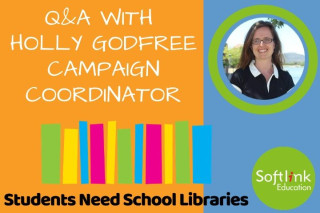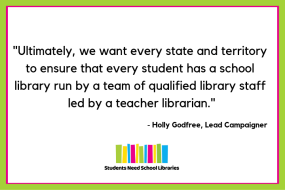- Your School Type
- Solutions
- Resources
- Blog
- Events
- More
- Contact Us
- Book a Demo
- Get a Quote

For this blog post, first published in November 2018, we had the pleasure of interviewing Holly Godfree, Teacher Librarian and Campaign Coordinator for the Students Need School Libraries campaign launched on 16th October 2018. Holly answered our questions about this exciting Australia-wide initiative, promoting the importance of school libraries and encouraging advocacy on this issue among the general public, with a particular focus on parents.
Fast forward 13 months and a lot has happened. Support for the Students Need School Libraries campaign continues to build.
The campaign was the brainchild of the ‘Advocacy’ team within the School Library Coalition, a working group of representatives from all Australian school library associations and all states and territories around Australia. The other leaders of the campaign include Madison Dearnaley (QLD), Carol Grantham (SA), Sue Johnston (SA) and Hajnalka Molloy (SA).
The origin of the campaign was a very 21st century moment. We were at our third annual Coalition face-to-face meeting of representatives from around the country, and we hadn’t really been making any progress with this very urgent situation facing Australian school libraries. We realised that there were LOTS of people not in that room who are deeply passionate and knowledgeable about school libraries, and we decided to throw the virtual doors open to anyone who wanted to help. We announced the campaign at the 2017 ASLA conference in Sydney, and the response was immediate, positive and huge.
The school library staff, services and resources impact the teaching and learning of every student and every teacher. A dynamic, well-resourced school library positively affects every lesson taught because time is saved finding quality resources, high quality assistance is provided through collaborative working relationships, and a thriving culture of reading underpins academic and social health.
A weak school library means that each student and each teacher has to fend for themselves to try to locate high quality information and resources, find good books to read, and develop information and digital literacy skills to navigate our rapidly-changing, high-stakes, information-rich world. Time and energy are wasted, learning outcomes can’t help but be reduced, and futures look much less rosy.
People who cross the orbit of the school library universe have long been distressed about the ongoing erosion of so many school libraries around the country. Many of us have been trying for years to work directly with the ‘decision makers’ (politicians, principals and education departments) and failing to reverse the downward trend. The Senate Inquiry was a perfect example of this – a bright political spotlight on the situation that failed to make any large-scale, positive impact.
We were disheartened, and we decided to change tack. We decided to go directly to parents/grandparents/carers/anyone who cares about the education of young people. For myself, I can recall talking to a mum on an aeroplane a few years ago about the state of school libraries and how surprised and dismayed she was by what I told her. She said decisively that she was going to find out more about her child’s school library when she got home. I realised then, that most parents probably have no idea what’s going on and that they would likely be alarmed and possibly motivated to take action when they found out. This campaign aims to, first, alert them to the current inequitable and unfortunate situation many schools are in. Then, we will support them with ideas and resources to ask the right questions and take action to influence those schools without qualified staff running their libraries.

Good question! Naming the campaign was an enormous, complicated, difficult, very messy process – take my word for it! The short answer is that we needed it to be simple and attention-grabbing. Also, I would say we are meeting our audience ‘where they are.’ Non-library people just think about ‘the school library.’ Our campaign is actually about the staff who work in a library, but we need to get people’s attention first. Then we can flesh out their understanding of the components involved.
I would argue that Softlink’s School Library Survey is actually the only solid, concrete outcome from the Senate Inquiry (which identified the clear need for Australian data about school library staffing).
Softlink has generously shared quite a bit of their (de-identified) data with us for the campaign. This is being analysed to help us answer the inevitable questions which will arise after the launch about hard data regarding school library staffing.
I urge everyone reading this to complete the survey and to encourage others to do the same.
Overall, my experience of this campaign has been one of joy, synchronicity and things falling into place beyond what I ever imagined. Having said that, it became very large and very complicated very quickly over those first six months.
Challenges for me as the project leader include things like: How do I effectively delegate components of the campaign? What is the best way for decisions (large and small) to be made? How do we share meaningful responsibility and maintain a clear, focussed vision for our outcome?
The things that have helped me include: realising when I need help and asking for it, reading some books about grassroots social movements and management practices within non-profit organisations, consulting experts and brainstrusts in difficult situations, getting regular exercise and taking breaks!
Ultimately, we want every state and territory to ensure that every student has a school library run by a team of qualified library staff led by a teacher librarian. The steps to get there will be to:
So many wins… The huge number of people who signed up for the campaign email list. The number of brilliant, motivated people who have taken on large and small tasks to get us where we are. The generous help of organisations like Softlink, Syba Signs and SCIS who sought us out to offer all sorts of practical help. The number of authors who have enthusiastically promised their support. I’ve been so excited so many times. It’s been fantastic.
The first step is to spread the word. We would like people to connect with us on Facebook and Twitter and post about the campaign to their own networks. If people sign up to our (occasional) newsletter, they will be in the loop. The link for the newsletter is on the bottom of our website.
What we need right now is for each person to reach out to their personal and professional communities to sign up interested individuals and groups. Think outside the box! Parents (and concerned people) are everywhere. Just a few examples:
We need people and organisations to link with our social media accounts (Facebook and Twitter). We need people to purchase posters about our campaign from Syba Signs and hang them in the local shops. We want to get on ‘the radar’ and to change the discourse. We want to make it OBVIOUS to everyone that of course every school library needs to be run by qualified professionals. That way, those aforementioned ‘decision makers’ will feel safe, happy and confident when they finally make the decision we want.
The 7 Signs Your Child Needs Help From Their School Library collateral, which includes flyers and posters, are designed to engage and inform parents or carers.
To download, please click here.
Softlink was also proud to support #StudentsNeedSchoolLibraries Australian campaign and #GreatSchoolLibraries in the UK by producing the All students need great school libraries video to promote the value of school libraries.
Share this video with your networks to promote the value of school libraries and the staff that run them.
You can access the video here.
While it’s a year on, the initial interview with Holly provides great background to the development of the campaign. We hope you enjoy it, and you can also find links to further information and webinar recordings below.
Visit this page to access useful resources including a recording of Holly’s webinar presentation hosted by Softlink Education on 19 October 2018.